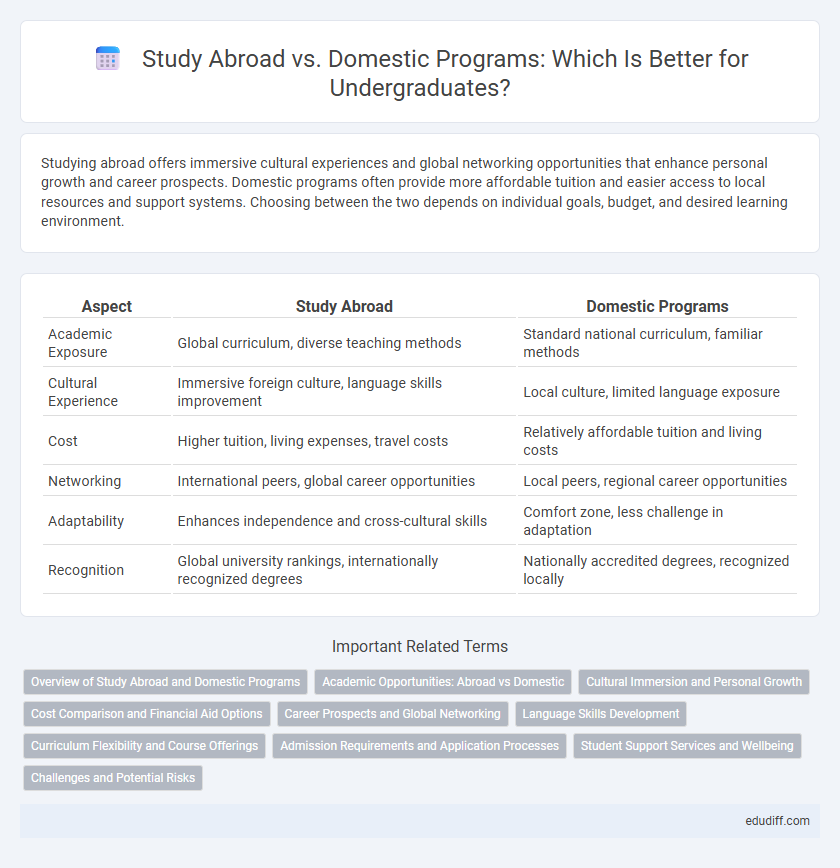Studying abroad offers immersive cultural experiences and global networking opportunities that enhance personal growth and career prospects. Domestic programs often provide more affordable tuition and easier access to local resources and support systems. Choosing between the two depends on individual goals, budget, and desired learning environment.
Table of Comparison
| Aspect | Study Abroad | Domestic Programs |
|---|---|---|
| Academic Exposure | Global curriculum, diverse teaching methods | Standard national curriculum, familiar methods |
| Cultural Experience | Immersive foreign culture, language skills improvement | Local culture, limited language exposure |
| Cost | Higher tuition, living expenses, travel costs | Relatively affordable tuition and living costs |
| Networking | International peers, global career opportunities | Local peers, regional career opportunities |
| Adaptability | Enhances independence and cross-cultural skills | Comfort zone, less challenge in adaptation |
| Recognition | Global university rankings, internationally recognized degrees | Nationally accredited degrees, recognized locally |
Overview of Study Abroad and Domestic Programs
Study abroad programs offer undergraduate students immersive cultural experiences and access to diverse academic resources in international universities, enhancing global perspectives and language skills. Domestic programs provide convenience, lower costs, and opportunities to build networks within the home country, often featuring partnerships with local institutions and industries. Both options contribute uniquely to academic development and career readiness, depending on students' goals and resources.
Academic Opportunities: Abroad vs Domestic
Study abroad programs offer unique academic opportunities such as exposure to diverse teaching methods, access to specialized courses unavailable domestically, and immersive language learning experiences. Domestic programs tend to provide comprehensive curricula aligned with national accreditation standards and easier access to familiar academic resources and support networks. Choosing between study abroad and domestic programs depends on the student's academic goals, field of study, and preference for international exposure or local academic rigor.
Cultural Immersion and Personal Growth
Studying abroad offers unparalleled cultural immersion, enabling undergraduates to engage directly with diverse traditions, languages, and social norms, which accelerates personal growth and adaptability. Domestic programs provide a more familiar environment but often lack the depth of cross-cultural experience crucial for developing global competencies. Research shows that students in study abroad programs report higher levels of cultural sensitivity and self-confidence, essential skills in today's interconnected world.
Cost Comparison and Financial Aid Options
Study abroad programs often have higher upfront costs compared to domestic programs, including tuition, travel, and accommodation expenses, but many universities and external organizations offer scholarships and grants specifically for international study. Domestic programs generally have lower tuition fees and eliminate international travel costs, making them more affordable for many students, with financial aid packages frequently covering a substantial portion of expenses. Evaluating both options involves examining the availability and eligibility criteria of financial aid to maximize funding opportunities and minimize out-of-pocket costs.
Career Prospects and Global Networking
Study abroad programs enhance career prospects by providing international experience valued by global employers and fostering cross-cultural communication skills. Domestic programs offer strong local industry connections and internship opportunities crucial for region-specific careers. Global networking gained from studying abroad expands professional contacts worldwide, while domestic study secures a robust network within a familiar economic landscape.
Language Skills Development
Study abroad programs offer immersive language experiences that significantly enhance proficiency through real-world practice and cultural interaction. Domestic programs often provide structured language instruction but lack the contextual immersion necessary for advanced conversational skills. Students aiming to develop fluency benefit more from study abroad opportunities due to constant exposure and practical application of the target language.
Curriculum Flexibility and Course Offerings
Undergraduate study abroad programs often provide greater curriculum flexibility and access to diverse course offerings not typically available in domestic programs. Students can explore specialized subjects, regional studies, and unique interdisciplinary courses tailored to the host country's academic strengths. Domestic programs may offer robust core curricula but generally have less variation in electives compared to the expansive international course options found in study abroad experiences.
Admission Requirements and Application Processes
Study abroad programs often require proof of language proficiency, international transcripts, and additional visa documentation, making the admission process more complex than domestic programs. Domestic programs typically focus on standardized test scores, high school GPA, and letters of recommendation, streamlining the application process. Understanding these differences helps applicants prepare accurate and complete submissions tailored to each program's criteria.
Student Support Services and Wellbeing
Study abroad programs often provide specialized student support services tailored to navigating cultural adjustments, including language assistance, orientation sessions, and dedicated counseling. Domestic programs typically offer comprehensive wellbeing resources such as mental health services, academic advising, and campus community engagement opportunities that foster familiarity and consistent support. Access to robust support systems in both settings enhances students' academic success and overall mental health during their undergraduate experience.
Challenges and Potential Risks
Study abroad programs expose undergraduates to cultural adjustments and language barriers that can affect academic performance and social integration. Domestic programs often provide a more familiar environment but may lack the immersive experience essential for global competency development. Both options carry risks such as financial strain, homesickness, and variations in academic credit transferability, impacting overall educational outcomes.
Study Abroad vs Domestic Programs Infographic

 edudiff.com
edudiff.com